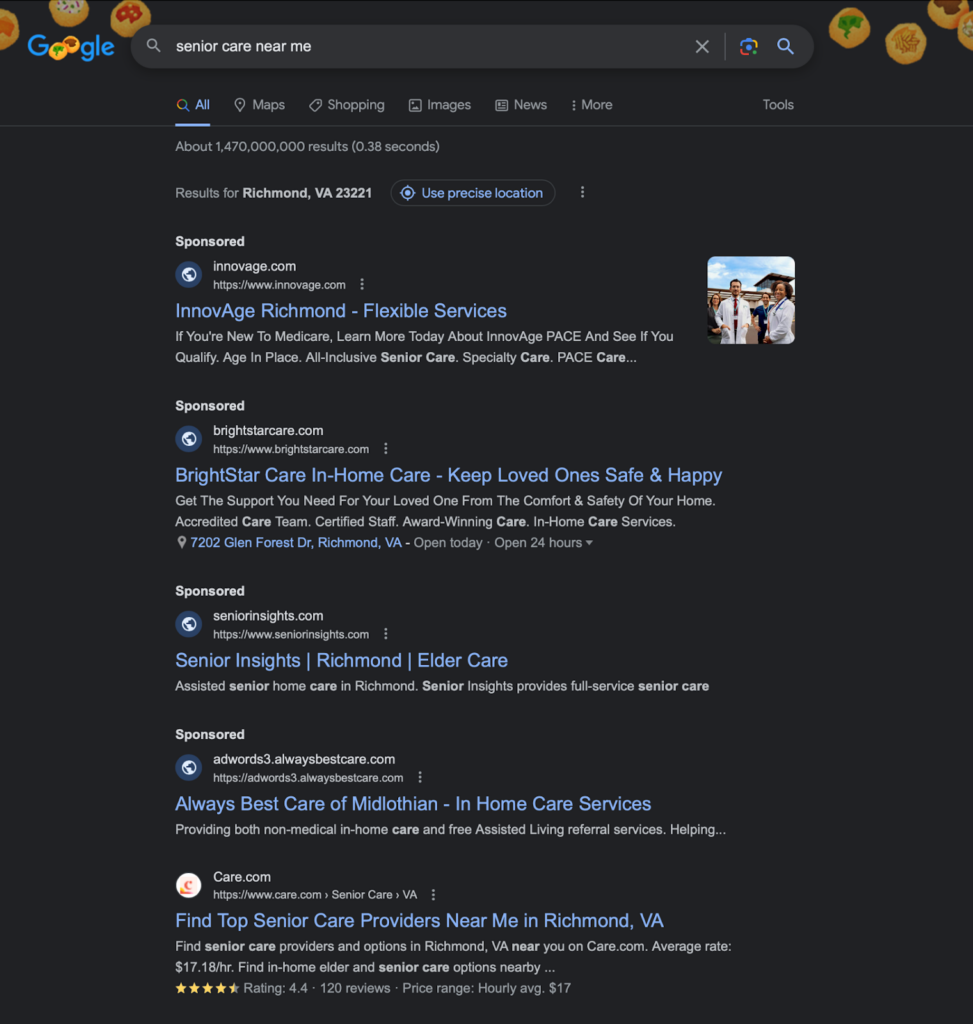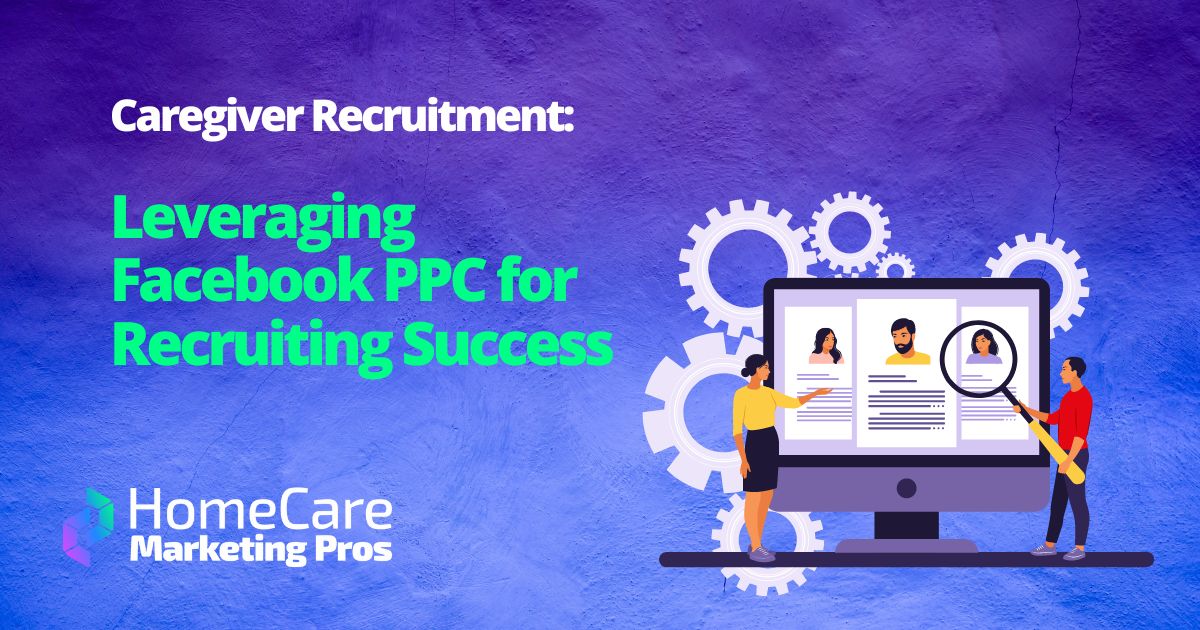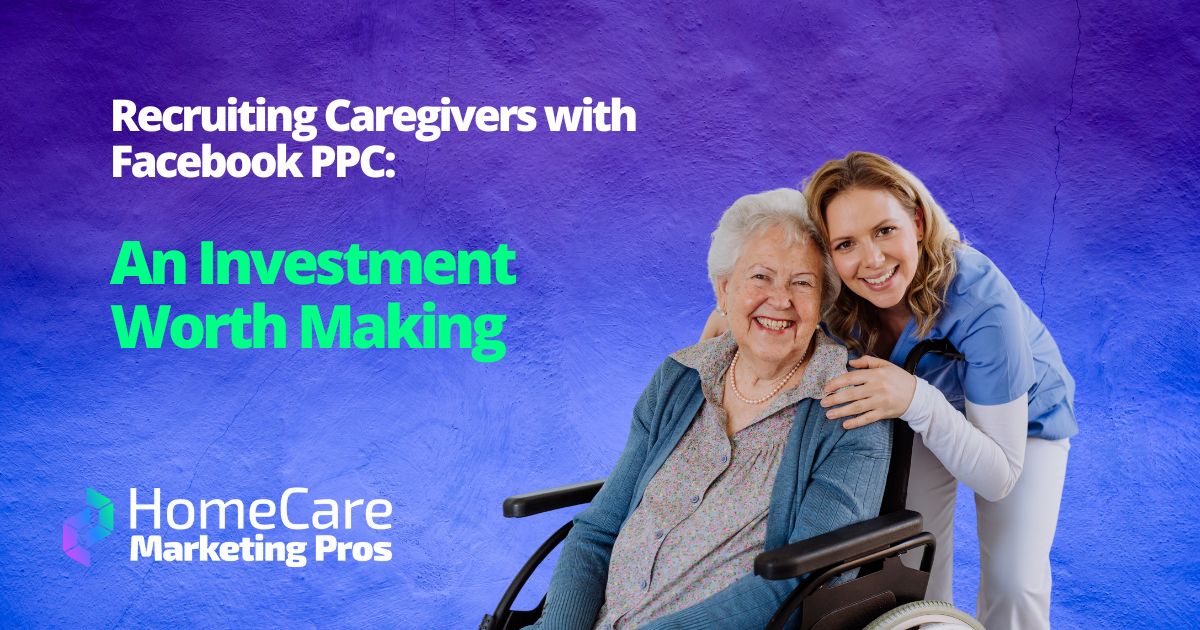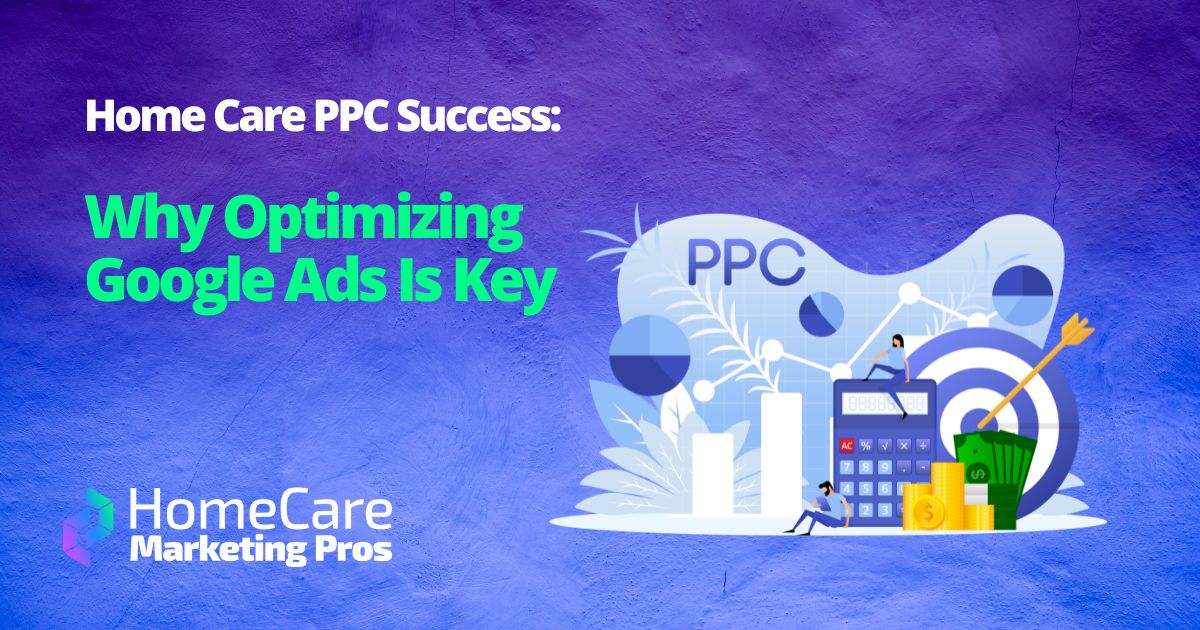Demystifying PPC for Home Care: Understanding the Basics & How It Works
Learn the foundations of PPC and search engine marketing and how it can work for your home care agency

No digital marketing strategy is complete without digital ads. There are myriad forms, formats, and platforms, but for home care marketers, paid search is by far the most valuable.
Here’s what you need to know to get your PPC campaigns started.
How does PPC work in digital marketing?
PPC stands for pay per click. It’s an ad model in which the advertiser pays only when a user clicks on an ad.
There are many types of PPC campaigns, like social media and display (more on that later), but the most common type of PPC campaign is search engine marketing (SEM).
With SEM, you pay to place your ad on search engine results pages (SERPs). Take this SERP for the query senior care near me. The first four results are PPC ads from local providers.

Everything labeled Sponsored was paid for on Google Ads. Everything below that is an organic search result, meaning that those pages are listed there based on Google’s algorithm deeming them the most relevant—they did not pay Google to be placed there.
Is organic search marketing better than paid search?
Not necessarily. They serve different purposes, but do operate in tandem. Both are a valuable part of a digital marketing strategy.
Organic search strategy is known as SEO. This is when you build pages on your home care website that are intended to answer queries that users plug into search engines. You might want to rank on page one for a term like senior home care bethesda maryland, so you optimize a page on your website all about your Bethesda-area services. If this costs you anything, it’s usually the time and energy to create a great page, but you don’t pay anything to Google.
It takes time to rank in organic results, so SEO is a long-term strategy.
Paid search, or PPC, as we’ll call it in this article, is when you pay to appear at the top of the page for the query senior home care bethesda maryland. While you do have to build a helpful landing page and write good ad copy that satisfies the query, you don’t have to wait to earn that spot, you can pay for it.
PPC produces results much more quickly than SEO does.
Why use PPC in home care marketing?
We recommend PPC search marketing for home care agencies for these benefits:
1. Rank more quickly
Practically speaking, you can have a campaign up and running in less than an hour—though we recommend a little more planning.
If you’re just getting started with SEO, then you can go ahead and put your business on page one while you wait to earn those organic rankings. When you do start to rank organically, you can use PPC to occupy that much more real estate on page one.
2. Turn search engine users into qualified leads by sending them directly to landing pages
With paid search, you can send users directly to landing pages designed to encourage visitors to provide you with their contact information. Lead. Added.
3. Mine actionable insights from your campaigns
Unlike with SEO, home care marketers can rapidly test ad copy and landing page copy (and design) to find the combinations that drive the most conversion.
What is Google Ads?
Google Ads is the platform where marketers run ads on Google results pages. It’s the most popular search engine marketing platform, and, in addition to Facebook, it's one we recommend home care marketers use.
Google Ads has a lot of great built-in features, like Keyword Planner, which lets you conduct keyword research and pick the queries you want to bid on, balancing search volume, competition, and cost.
Do paid search results affect your organic rankings?
Yes and no.
No, it doesn’t affect Google’s behavior. If you already rank on Google for keywords related to home care, you won’t get better PPC rates or be more likely to top a competitor bidding on the same keyword.
However, it might affect users’ behavior. There is evidence to suggest that when a marketer has both a PPC ad and an organic result on the same page, users are more likely to click.
How to build a PPC campaign in 9 steps
1. Identify your goals
The best goal for a paid search campaign is to collect users’ contact information. We recommend this as your primary metric: the number of qualified leads added to your home care funnel.
You might also identify secondary campaign goals, like content downloads, testing ad copy, and identifying new audience segments.
2. Pick your landing page
Your landing page, which is where users end up when they click on your PPC ad, should match your ad copy and the keyword intent.
It should include a form-fill to collect information, and you should also give the user some value without requiring them to give their information—like information on the page about services, costs, or healthcare best practices. Earn their trust by providing them with some value.
Pro tip: Your landing page should not be your home care website’s home page, but one designed specifically for the campaign you’re running.
3. Pick your platform
We recommend Google Ads for home care marketers looking to advertise on a search engine. You can have your ads up and running quickly, easily optimize in flight, and learn from user engagement.
4. Select your keywords
Google Ads has an excellent keyword research tool, called Keyword Planner, which you can use to find keyword and best suit your campaign. Let’s say you’re interested in poaching leads from senior care competitors. You can use Keyword planner to find the most commonly searched terms related to residence homes (for example) in your area.
5. Define your audience segments
Start your PPC campaign with what you already know about your ideal clients. That’s usually things like income and location. Over time, you can refine that information and add parameters that make your targeting more precise, like gender, income, and interests.
6. Write your ad copy
Good PPC ad copy is succinct, descriptive, and includes the keywords you’re trying to rank for. And importantly, it’s written for people, not search engines.

7. Set your budget
With Google Ads, you can’t overspend because you set the budget, and your campaign will run until that budget is exhausted.
8. Optimize in-flight
As users start to engage with your ads and landing pages, you will start to learn which ones work best. Use the best ones, drop the rest.
9. Examine your results to improve future campaigns
You may be surprised about who responds to your PPC campaign—perhaps a new demo segment you hadn’t thought of. You can use that information in your next PPC campaign, and in all your marketing strategies.
Let Home Care Marketing Pros start your agency off on the right foot with professional PPC management
Here at Home Care Marketing Pros, we will create a campaign based on your goals, your budget, and your target audience’s search behaviors. And then we’ll optimize your campaign each month to maximize your response…and minimize your cost. Watch a demo of our services to get started!










